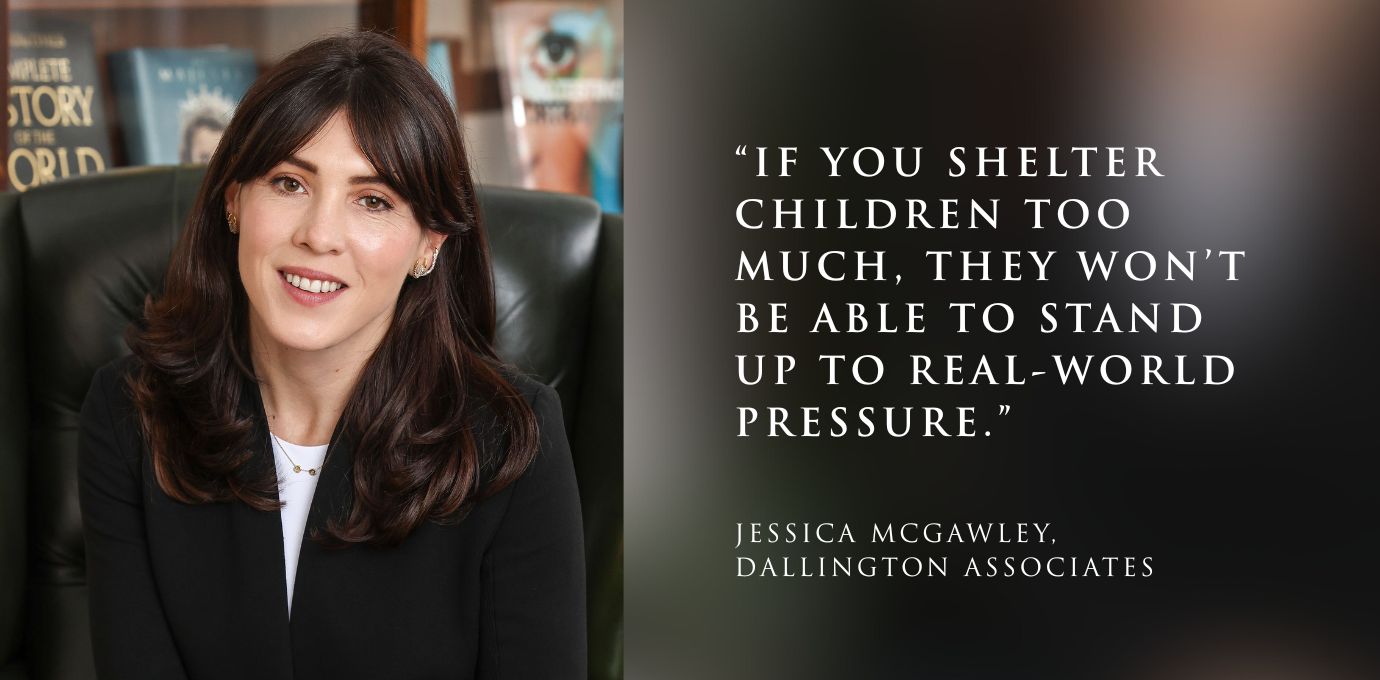How to help your child develop grit, independence and problem-solving ability when they’ve never had to struggle.
This is the first in a three-part series based on our conversation with psychological consultant Jessica McGawley. Each piece explores how families of exceptional wealth can raise emotionally and practically grounded young adults – and how Tutors International supports that journey.
When parental protection becomes a barrier
Jessica McGawley has worked with prominent families for more than 15 years, supporting their children through the challenges of growing up in a world of wealth, public identity and global opportunity. A qualified psychological consultant and mediator, she founded Dallington Associates in 2016 – the first specialist mentorship practice designed specifically for the Rising Generation.
At its heart, Dallington helps young adults develop independence and self-esteem. Through mentoring, psychotherapy, mediation and tailored support sessions, they help their clients navigate life between 16 and 28 – that crucial window when young people are expected to make adult decisions, often without the scaffolding others take for granted.
“Well‑intentioned parents often put to many safety nets in place. But in doing so, they can unintentionally remove the very experiences that build real-world strength.”
Jessica calls this the resilience paradox. The more we do to ensure a smooth path for our children, the less prepared they are for what lies beyond it.
When opportunity backfires
At Tutors International, we’ve supported students with rare academic gifts, boundless opportunity - and deep-seated anxiety.
Take one of our tutees, who we’ll call Sebastian - a late teen whose family was based between New York and Geneva. He’s a bright, curious, multilingual student, but when his tutor asked him to book train travel for a short academic residency, he panicked. He’d never arranged transport by himself.
“He was used to someone else taking care of logistics,” the tutor recalls. “So I let him try. He booked the wrong date, missed a connection, and ended up calling in a flap. But we didn’t jump in. We helped him work through the options. The next trip he made, he nailed it.”
Resilience isn’t a personality trait. It’s a muscle. And like any muscle it needs resistance to grow.
What trees in Arizona can teach us about resilience
Jessica tells the story of the Biosphere 2 Project in Arizona, a sealed environment designed to simulate Earth’s ecosystem. Trees grew quickly inside it - but collapsed before maturity.
Why? No wind. No environmental challenge. No reason to develop strength.

“If you shelter children too much,” Jessica says, “they won’t be able to stand up to real-world pressure.”
What Tutors International tutors do differently
We don’t believe in manufacturing hardship. Or throwing a child into something brutal for the sake of “character.” But we do believe in:
- Letting mistakes play out (within safe, age-appropriate limits)
- Inviting problem-solving rather than supplying the answer
- Modelling boundaries and emotional self-management
- Gently withholding help until a child asks, reflects, or attempts
And above all, we support families in pausing before they fix.
Jessica calls this one of the most powerful shifts any parent can make:
“You’ll never build resilience in your child if you solve everything for them. Instead, say: ‘I believe you can work this out. What do you think you need to do?’”
Structured freedom builds grounded confidence
At Dallington, Jessica doesn’t use lectures or artificial struggle. Instead, she advocates for space:
“Many UHNW parents over-schedule their children – internships, enrichment, travel, sport. It looks brilliant on paper. But these kids are exhausted. Often, what they need most is boredom. That’s when creativity returns. That’s when they actually talk to you.”
Our tutors work with this same ethos. A Tutors International placement provides consistent support. Tutors act as calm, emotionally intelligent adults who hold the line just long enough for the young person to step up.
Resilience isn’t loud
It’s not swagger. It’s not bravado. It’s the quiet belief that you can face something unfamiliar and handle it.
One of Jessica’s go-to questions for clients at Dallington is simple:
“What are you solely responsible for in your life right now?”
For many UHNW teens, the answer is almost nothing. “My hygiene,” some say, half-joking. That’s not a punchline - it’s a starting point. Responsibility is layered. And our role, whether as tutors or parents or mentors, is to scaffold that growth intentionally.
And a final word from Tutors International founder and CEO, Adam Caller:
“People think tutoring is about grades. And of course, academic excellence is part of it. But what matters most, especially for our client, is the emotional and practical readiness to thrive in a complex world. That’s what experienced tutors can provide.”
